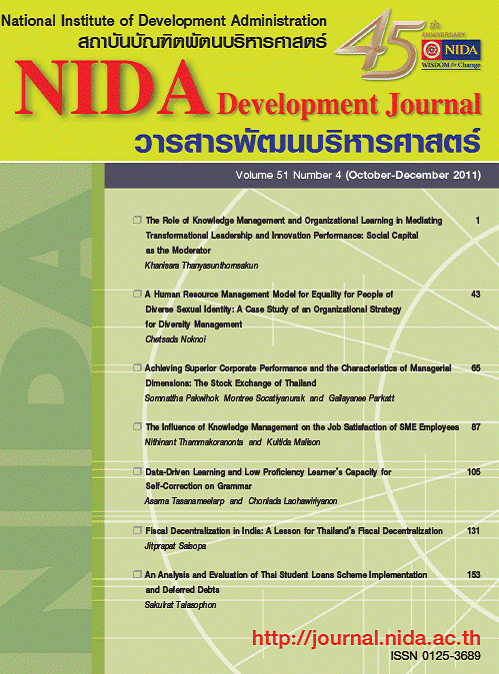A Human Resource Management Model for Equality for People of Diverse Sexual Identity: A Case Study of an Organizational Strategy for Diversity Management
Keywords:
Diversity Management, Equality, People of Diverse Sexual Identity, Sexual Orientation, Human Resource Management (HRM)Abstract
This research aims to study the acceptance of and discrimination against people of diverse sexual identity in the workplace, including the factors and contexts which affect human resource management (HRM) regarding equality in organizations. This research used qualitative methodology; data were gathered from people of diverse sexual identity in both public and private organizations and a narrative analysis technique was used to explore the stories of key respondents from in-depth interviews. Snowball sampling was also employed. The key respondents were people from the workplace that recognised their diverse sexual identity. This research was performed with 43 key respondents using typological analysis and analytic induction. The results revealed the current situation with regard to the acceptance of and discrimination against people of diverse sexual identity in the workplace in Thailand. The factors and contexts affecting HRM for equality for people of diverse sexual identity in organizations consisted of personal characteristics, including sex, occupation, expression and perception of other people, organizational management of diversity, e.g. organizational education in diversity and committees for diversity, training, and education about the diversity of HR, advisors/informal groups of advisors, anti-discrimination policy and other contexts featuring social values and laws. The results were used to form an HRM model of equality for people of diverse sexual identity.
งานวิจัยนี้มีวัตถุประสงค์เพื่อศึกษาการยอมรับและการเลือกปฏิบัติต่อผู้มีอัตลักษณ์หลากหลายทางเพศในสถานที่ทำงาน รวมถึงปัจจัยและบริบทซึ่งส่งผลต่อการบริหารทรัพยากรมนุษย์อย่างเท่าเทียมในองค์กร งานวิจัยนี้ใช้ระเบียบวิธีวิจัยเชิงคุณภาพ โดยการเก็บข้อมูลจากผู้มีอัตลักษณ์หลากหลายทางเพศซึ่งทำงานในหน่วยงานภาครัฐและภาคเอกชน ใช้เทคนิคการวิเคราะห์เรื่องราว (narrative analysis) ซึ่งได้จากการสัมภาษณ์แบบเจาะลึก การสุ่มตัวอย่างเป็นแบบ snowball กลุ่มตัวอย่างคือผู้ซึ่งยอมรับการเป็นผู้มีอัตลักษณ์หลากหลายทางเพศของตน ซึ่งงานวิจัยนี้เก็บข้อมูลจากกลุ่มตัวอย่างทั้งสิ้น 43 ราย การวิเคราะห์ข้อมูลใช้วิธีการจำแนกประเภทข้อมูล (typological analysis) และการสร้างข้อสรุปแบบอุปนัย (analytic induction) ผลการวิจัยทำให้ทราบสถานการณ์ปัจจุบันของการยอมรับและการเลือกปฏิบัติต่อผู้มีอัตลักษณ์หลากหลายทางเพศในสถานที่ทำงาน ในประเทศไทย ปัจจัยและบริบทซึ่งส่งผลต่อการบริหารทรัพยากรมนุษย์เพื่อความเท่าเทียมกันของผู้มีอัตลักษณ์หลากหลายทางเพศในองค์กรประกอบด้วย ลักษณะส่วนบุคคล ได้แก่ เพศ อาชีพ การแสดงออก และการรับรู้ของบุคคลอื่น การจัดการความหลากหลายในองค์กร ได้แก่ คณะกรรมการบริหารองค์กรมีความหลากหลาย การฝึกอบรมและให้ความรู้เกี่ยวกับความหลากหลายของทรัพยากรมนุษย์ การมีที่ปรึกษาหรือกลุ่มที่ไม่เป็นทางการให้คำแนะนำ และนโยบายการไม่เลือกปฏิบัติต่อกลุ่มใด ๆ บริบทอื่น ได้แก่ ค่านิยมทางสังคม และกฎหมาย ผลการวิจัยนำไปสู่การสร้างตัวแบบการบริหารทรัพยากรมนุษย์เพื่อความเท่าเทียมกันของผู้มีอัตลักษณ์หลากหลายทางเพศ





